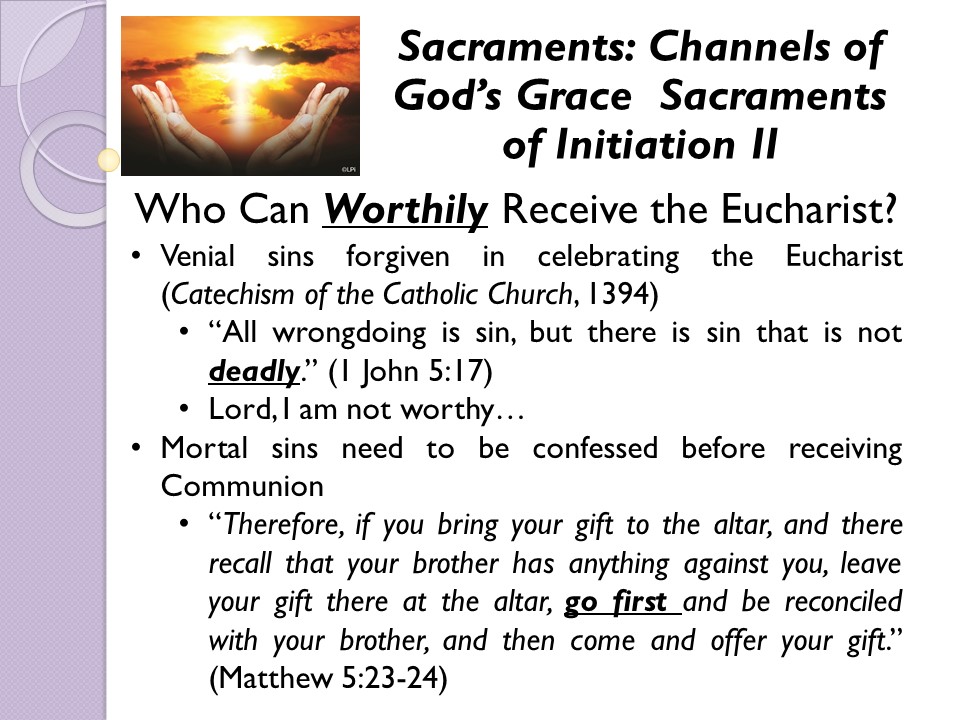As I have been looking for topics for new articles for this blog, the topic of who can receive Communion in the Catholic Church has been in the news. In the news it involves politicians. I am not going to talk about politicians or any other particular individual receiving Communion. Today I would like to offer some thoughts that I have previously discussed in some of my previous blog articles on the Eucharist and in the third presentation in my series on the Sacraments that discussed the Eucharist.
As I begin, the first thing we need to remember is what it is that we receive in the Eucharist. It is not ordinary bread and wine. We need to look beyond the bread and wine to see the Body and Blood of Jesus. Recognizing what it is that we receive, we ask ourselves if we are worthy to receive it. Paul reflects on this in the quote on this slide taken from my third presentation on the Sacraments.

Can we “make” ourselves worthy? No, but the good news is that Jesus makes it possible for us to be worthy. The reality is that we sin. Sometimes it is venial sin and sometimes it is mortal sin (again this slide is taken from my third presentation on the Sacraments).

If we find we have committed mortal sin, then we need to go to the Sacrament of Reconciliation to confess our sins and receive God’s forgiveness that He is eager to bestow upon us. While the recent news coverage has centered on politicians who support abortion, any mortal sin breaks our relationship with God. Only God can restore the broken relationship. The good news is that He is eager to do.
In considering who can receive Communion in the Catholic Church, we also need to reflect on what the word “Communion” means. We use the word “Communion” to signify being in common belief, not simply with each other but with God. The word “catholic” means universal. In “Catholic” with a capital “C,” we are speaking specifically of the Catholic Church. This starts with a belief in the Real Presence of Jesus in the Eucharist.
It also includes formally joining the Catholic Church. In my article, “On Non-Catholics Receiving Communion,” I wrote “I was reading Exodus 12, when I came to Exodus 12:43, “The Lord said to Moses and Aaron: This is the Passover statute. No foreigner may eat of it.” The Passover was to the Israelites what the Eucharist is to Catholics. It is essential to our identity. This verse from Exodus 12:43 tells us that the Lord himself prescribed that no “foreigner” could share in the Passover Lamb. I see this as laying a foundation for our Catholic teaching against non-Catholics receiving Communion.” The idea that non-Catholics should not receive Communion in the Catholic Church is not an invention of the Catholic Church. It flows from what the Lord said to Moses in Exodus 12:43.
Where do we find the truth that goes with this idea of “Communion” as holding a common belief? It is not human beings who are the origin of the Truth. It is God. God often reveals his Truth to us through other people but it always has God as its source (see my presentation, Where Do We Go for Truth).
In discussing the issue of receiving Communion, Pope Francis has referred to Communion as a “medicine of Mercy” (a phrase taken from St. Pope John XXIII at the Second Vatican Council) rather a reward for the good. The Eucharist is a gift to heal and strengthen our souls. Indeed, it is not a reward for being good on our own. We are not. We sin. In the Act of Contrition we “firmly resolve” to sin no more yet we do. We need the Eucharist to strengthen us. We may sin again but we should ask ourselves are we even trying to change. It is difficult. That’s why we need God’s grace, both in the Sacrament of Reconciliation and the Sacrament of the Eucharist.
The Eucharist is indeed a “medicine of mercy.” We take medicine when we are ill. If we know what is causing the illness, do we also not stop that? If we have ingested poison, should we not stop that? It is not enough to take the medicine if we keep taking the poison. Sin is poison to our souls.
To be Catholic is not to pick and choose what we believe. It is to seek to know what God teaches us and follow him. God gives us the Eucharist to strengthen us. We thank God for the gift of the Eucharist and for the Sacrament of Reconciliation for when we have fallen short.
Peace,
Fr. Jeff
